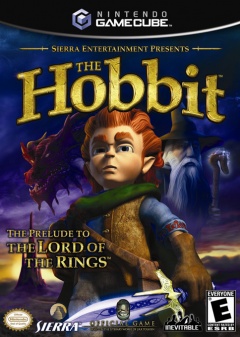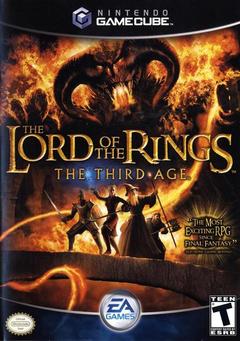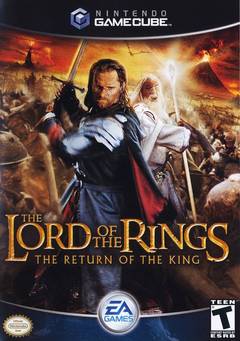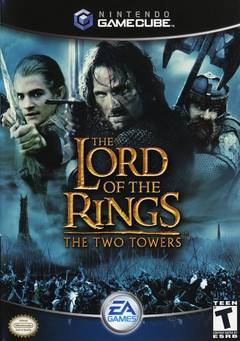lord of the rings
The Hobbit
 Marrying my wife a few months ago came with a videogamey bonus: a Nintendo Wii. And it wasn’t until several weeks back that I kind of realized that this system can also play GameCube games on it. The Nintendo GameCube is a system I missed out on hard, having only really played two games to my memory: Luigi’s Mansion and Pikmin. GameStops statewide seem to still sell a good selection of GameCube games, and I was able to pick up The Hobbit for less than a cup of coffee and a breakfast sandwich from the local market. As a true J.R.R. Tolkien fanboy, I couldn’t wait to play it. Alas, I had to wait. Long story short, I had to make a return trip to pick up a memory card so I could actually save my progress.
Marrying my wife a few months ago came with a videogamey bonus: a Nintendo Wii. And it wasn’t until several weeks back that I kind of realized that this system can also play GameCube games on it. The Nintendo GameCube is a system I missed out on hard, having only really played two games to my memory: Luigi’s Mansion and Pikmin. GameStops statewide seem to still sell a good selection of GameCube games, and I was able to pick up The Hobbit for less than a cup of coffee and a breakfast sandwich from the local market. As a true J.R.R. Tolkien fanboy, I couldn’t wait to play it. Alas, I had to wait. Long story short, I had to make a return trip to pick up a memory card so I could actually save my progress.
Anyways…The Hobbit. It came out in late 2003, and I’m assuming that its makers were banking on a lot of eager fans awaiting more Lord of the Rings action would be interested in seeing how the journey all started. In fact, blazing bright and gold on the game’s cover is some silly marketing pullquote that says “the prelude to the Lord of the Rings!” Yeah, we know. Hopefully they don’t pull the same silliness with the upcoming theatrical adaptation. The Hobbit, Part 1 of 2: The Prelude to the Lord of the Rings! Bad enough there’s going to be two films.
I’ve played a number of other games based on the Lord of the Rings over the years. Some were decent amounts of fun (The Lord of the Rings: The Two Towers), and others just an unfair mess (The Lord of the Rings: The Third Age). Will The Hobbit soar like the Lord of the Eagles or sink like the One Ring abandoning its former master? Let’s find out with the game’s first sixty minutes.
The Lord of the Rings: The Third Age
And so we've come the the last game in the Lord of the Rings marathon. The good thing about this marathon is that it was much shorter than a Lord of the Rings movie marathon. Actually, beating all three games would probably take less time than watching the extended versions of the movies. Snarkiness aside, it would be a good idea to read the first two before venturing into this one.
After Return of the King was released, there was still enough hype about the Lord of the Rings movies to warrant releasing another game. Since the two previous games had already covered all the battles from the movies (and then some), EA decided to tap into a previously neglected genre: they released an RPG.
The Lord of the Rings: The Third Age is almost a JRPG, except it wasn't developed in Japan. Because of this, it has a little more Western influence on the storytelling and some of the gameplay.
The story was created just for the game and has you controlling new characters, mainly Berethor, a man of Gondor, who is searching for Boromir.
Will Lord of the Rings make a good RPG? Perhaps the bigger question is, will EA make a good RPG? Hmmm....
The Lord of the Rings: The Return of the King
The second game in my marathon is The Lord of the Rings: The Return of the King. To simplify, I will assume you have already read my Two Towers review, so if you haven't you may want to do that first.
Return of the King (RotK) is the follow-up to The Two Towers. This game was released in conjunction with the movie, so it follows it much more closely. The levels are taken only from the final movie (which doesn't always correspond to the final book).
In order to one-up the previous game, RotK raises the number of playable characters from three to five right off the bat, with several unlockable characters as well. It also adds interaction within the environment, two-player co-op, and a bunch of tweaks such as graphical enhancements.
Will these changes be enough to help Return of the King surpass The Two Towers? Will its First Hour be as well paced as its predecessor? Or will neither of these things happen?
The Lord of the Rings: The Two Towers
This is the start of a marathon of Lord of the Rings gaming, in which I play the first hour of three games based on the Lord of the Rings movies. Strangely enough the three games are not one for each movie; there was in fact no game made for the Fellowship of the Ring movie. Instead, I'll be playing Lord of the Rings: The Third Age as the third game.
The Lord of the Rings is one of the most beloved series of books ever written, and the movies based on them are some of the best-selling of all time. What I want to find out is if the IP was able to make the jump to video games with the same fidelity.
I read these books some years back, before the movies came out, and they are some of my favorite books. Because of this, I may throw around a few terms that are unfamiliar if you have not read the books or watched the movies. If this is the case I strongly urge you to read the books.
Electronic Arts had the video game rights to the Lord of the Rings films (Sierra had the rights to the books; I'm not really sure how that works), but since the first film came out around the time the console cycle entered the next generation, EA decided to skip Fellowship of the Ring and instead focus on releasing a game that coincided with the premier of The Two Towers. Because of this, the game starts with several scenes from The Fellowship of the Ring.
Which stigma will this game live up to: Lord of the Rings, or movie game? Find out. Here's the first hour of The Lord of the Ring: The Two Towers for the Nintendo GameCube.
Making a game from book or film
I recently finished a great fantasy book that is just ripe for turning into a video game. I actually began writing a short review about Mistborn: The Final Empire by Brandon Sanderson, but it quickly turned into an examination on book and movie based games and how they're designed. I quickly determined that there are two common methods of taking the original source and putting it into a gamers' hands, and I pretty much just threw the rest of the review away at that point (I hope to get around to it someday, this site does have book reviews for a reason). For better or worse, here's my examination of the two design mechanisms chosen when creating a game from an existing franchise. There are many factors that come into play when deciding between them, and honestly I think they often make or break the game.



